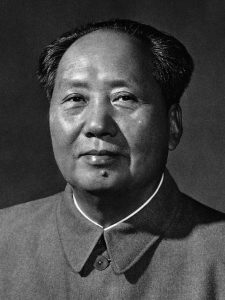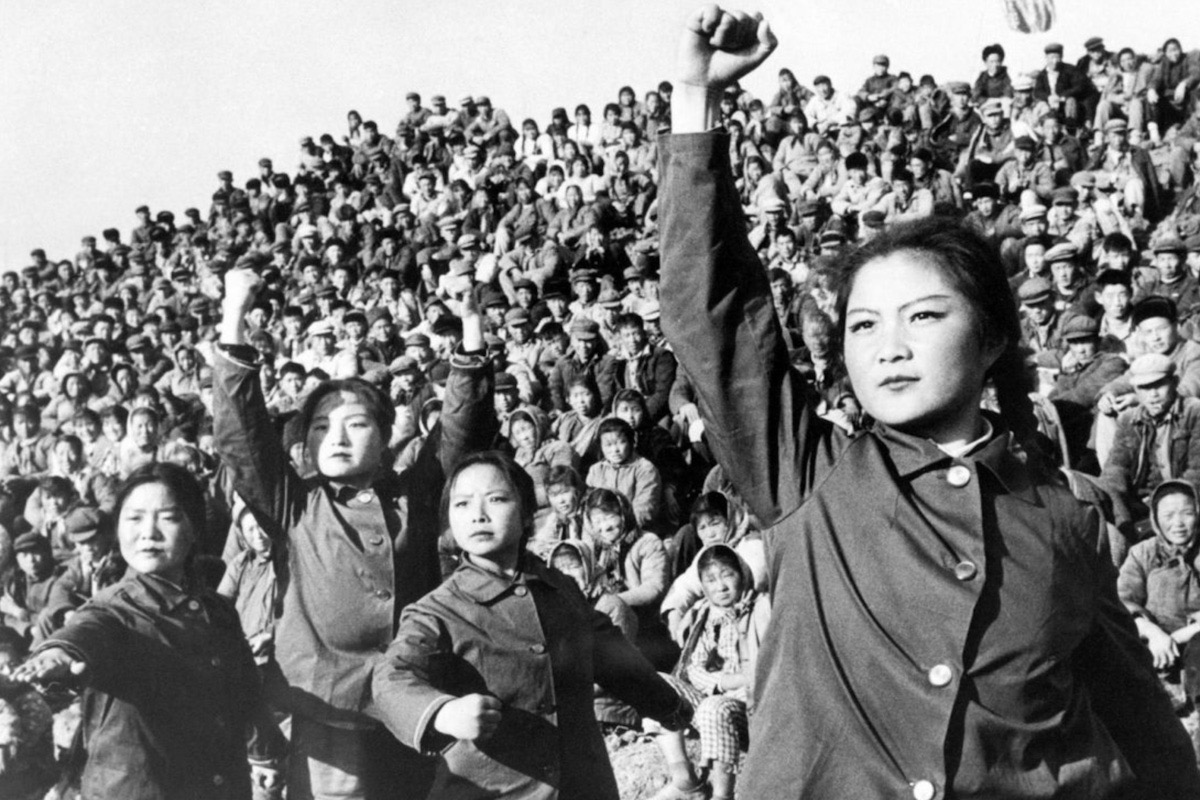Cultural Revolution
Misunderstanding Capitalism
This debate offered an opportunity to reflect on the respective merits of capitalism and socialism (the Jacobin representatives’ preferred alternative) and lessons from the past that might help us to build a better tomorrow.

On 3 November, Jacobin magazine hosted a public debate (available here) on the merits of capitalism. Representing Jacobin, Bhaskar Sunkara and Vivek Chibber made the case for the prosecution; representing libertarian magazine Reason, Nick Gillespie and Katherine Mangu-Ward made the case for the defense. Michelle Goldberg, a columnist for the New York Times, served as moderator and opened proceedings by declaring herself persuadable by either side. To the participants’ credit, it was exciting to see people of opposing viewpoints engaging in civil debate during these tribal and polarized times.
This debate offered an opportunity to reflect on the respective merits of capitalism and socialism (the Jacobin representatives’ preferred alternative) and lessons from the past that might help us to build a better tomorrow. It was, however, also a frustrating affair, not least because of persistent misunderstandings and misrepresentations of the subject at hand made by Jacobin’s participants.
‘Wage Bargains’
In an early contribution to the discussion around the 22 minute mark, Jacobin’s Vivek Chibber made the following argument:
At the center of capitalism is a blind, relentless pursuit of profits. It’s a compulsion. It is not a profit opportunity. It is not an entrepreneurial spirit. It is a compulsion, and everybody understands this. In capitalism, if firms don’t maximize profits, they die – or at least they risk death. Now this has a very important consequence and it goes straight to the question of freedom and autonomy which our colleagues are promoting. Because, in capitalism, for the vast majority of the population, there is no choice but to offer up their labor services for a wage, they have to go out and seek employment.
This “wage bargain,” Chibber went on to explain, necessarily involves a surrender of the personal autonomy his libertarian opponents claimed to uphold:
It’s not just that inside the workplace, the boss gets to tell me what to do. It’s that because he has the power to set the terms of the wage bargain, the boss also gets to decide what the level of the wage is.
By invoking the “surrender of autonomy,” Chibber seemed to be alluding to the familiar radical critique of capitalism as a form of ‘wage slavery.’ Broadly, this argument holds that selling your time is tantamount to becoming another’s property. This implication that workers in Western capitalist societies are wage slaves manages to insult those in the wider world who still live or have lived under slavery, and those fortunate enough to live in free societies who value themselves, their time, and their labor in today’s economic system. When Vivek Chibber undertakes research for NYU, I suspect he would acknowledge that he is not a slave in any sense.
Even if we can agree that capitalism generally benefits the middle and upper classes, the claim that a part-time retail service worker on minimum wage is subject to a kind of slavery is still the stuff of rhetoric and not serious argument. Retail capitalists cannot lash and beat their workers when they do not produce enough. They cannot trade workers with other capitalists. They cannot force their workers to reproduce to generate more property and so on.
On the contrary, at its most fundamental, capitalism is simply individual economic freedom. This is what is implied by the claim that capitalism is the “economic application of liberalism,” a phrase that made multiple appearances on the Reason side in one form or other. This means that any individual in a capitalist society can do whatever they want insofar as it relates to trade while respecting others’ liberties.
If I have a car, and I wish to have something else, I am free to offer that car for trade to anyone I like and for whatever price I wish. If, on the other hand, I am in the market for a car, I am free to peruse the available offers and say “yes/no” to whichever cars do/don’t take my fancy. This much is – or ought to be – obvious. My time and my labor are just other resources I have to offer and I am free to offer them to anyone who might purchase them. In this transaction, I am the one determining the price and conditions of my time.

When Katherine Mangu-Ward claimed that anyone can freely choose to stop working for their employer, the audience responded with derision. This derision suggests either a misunderstanding of what Mangu-Ward meant, or that her detractors refuse to accept any assessment of worth beyond self-worth. Just as an apple is only worth as much as someone will pay for it, one’s time is also exactly as valuable as the most anyone is willing to pay for it. When someone is derided for correctly pointing out that people have the ability to quit their job, it is probably because they recognize that this freedom is circumscribed by one or more of the following:
- Financial insecurity.
- A belief that their labor is more valuable than the compensation they are offered.
- Uncertainty about their ability to find another job.
Now, all of these concerns are appropriate and reasonable. I cannot quit my job if I rely upon the wage to pay my rent. I cannot quit my job if I don’t have another lined up and if my experience in job hunting has been miserable. It may be that the only way for me to make more money is with seniority-based raises. But these worries are not an indictment of capitalism per se. They are the result of living in a competitive society with others who are better at things than I am – either they have skills that are more desirable than mine, or they’re just better at selling themselves than I am.
The value of my time is a function of the scarcity and productivity of my labor. If I am a graphic designer, I have to compete for work with all the other graphic designers for job opportunities. If the market’s needs are met by other graphic designers offering their services, at their own volition, for a lower price than mine, then I am not a victim of capitalism, but the loser in a competition with my peers. Skills are required to succeed in a free market because what is most important is that I am able to set myself apart from all the other individuals around me. This is liberalism made manifest: the individual is most important, and individuals are afforded equality of opportunity so that they may prosper according to their strengths.
I do not believe that we are fit to assess our own self-worth, or the worth of those we care about. At the higher ends, we tend to overestimate our value (a tendency known as the Dunning-Kruger Effect) and at the lower ends, we often underestimate the scarcity and extent of our talents (a tendency known as Imposter Syndrome). The incongruity between our perceptions of what should be valuable and what is valued is a multi-faceted problem that at no point becomes a real criticism of capitalism. Capitalism is simply the system that facilitates the exchange of value, it does not prescribe it. People determine value, and these people will often be those you disagree with or who do not share your goals.
Credit Where It’s Due
During the debate, Bhaskar Sunkara spent a great deal of time taking credit for the accomplishments of long-dead men and women in the name of socialism. “Socialism,” he declared:
…fought for the 8-hour work week, for struggles for women’s suffrage, civil liberties for African-Americans, reproductive rights, the fight for gay marriage, and on, and on. And again, this is our history, this is our legacy, and this is our actual relationship to democracy in practice.
This move was designed to place the political Left on the ‘right side of history’ and it was not challenged by either the Reason panelists or by the moderator. This lack of response was surprising, not least because Sunkara’s claim had very little to do with the topic under discussion. To the extent that political parties on the Left were the progenitors of the kind of positive change and progress he described, many of these parties were not in favor of collectivist economic policies, and many of these changes in fact had nothing to do with either capitalism or socialism. This has been especially true in the American context, to which Sunkara explicitly referred, where Democratic Party politicians have historically been fiercely capitalist – up to and including that avatar of neoliberalism, Hillary Clinton.
Vivek Chibber, meanwhile, misrepresented the growth of the Chinese economy as the product of state ownership of capital. Katherine Mangu-Ward made the point that, in the last thirty years, the poorest people had been making tremendous progress in terms of wealth, health, and happiness as a direct result of capitalism. Chibber was correct to point out that these gains came primarily from India and China (where, it should be noted, there were and are a lot of very poor people). He wisely did not linger on the Indian example, because I suspect he knows that capitalism is indeed responsible for that country’s growth. So, instead, he asserted that China’s economy is still 50 percent state controlled, and that this fact is inconvenient for the capitalist side of the argument:
This idea that in the last 15 years, there’s been a massive decrease in poverty rates around the world. This is really driven by China. It’s a little bit misleading – I don’t want to be the pointy-head professor here, but it’s a little bit misleading what they’re saying. China is a country in which 50 percent of the revenue is still controlled by the state. If that’s your vision of capitalism, it’s not quite where you want it to be.

This claim simply falls apart under examination. China spent much of its recent history as a Communist state under Mao Tse-Tung, whose economic legacy was an unmitigated disaster. Improvements in Chinese welfare were a direct and unambiguous result of the capitalist reforms implemented in 1978 by Deng Xiaoping who sought to pull the country into economic shape after its calamitous socialist experiment.
Of course, Deng denied his reforms were capitalist. However, it is hard to see the privatization of industries and opening of trade as anything else. In a 2016 article for CNN, James Griffiths cites Frank Dikotter, author of The Cultural Revolution: A People’s History, 1962—1976, who argues that these reforms were a response to popular demand:
While Deng is often given credit for turning China from a collectivist, Communist economy into the powerhouse it would become, according to Dikotter, Deng’s reforms were a reflection of those forced upon the country from the bottom up, by a populace alienated to and despairing of Communism.
When Chibber protests that the Chinese economy remains 50 percent state owned, he is actually conceding that even a limited introduction of capitalism allowed China to recover from grinding economic hardship. It is simply intellectually dishonest to try and credit socialism with this improvement.

No True Socialist
While Sunkara & Chibber did not hesitate to credit socialism for all manner of desirable advances, they scrupulously omitted mention of the rather less desirable effects socialism had on millions of people, including the famines and forced labor camps. Such things were beyond their purview, they implied, because “we’re not in favor of historical socialism.”
But if you’re not in favor of “historical socialism,” then what are you in favor of? Without concrete examples of what your policies look like, the only avenue available to challenge your ideas is to make a Turing Machine of socialist strawmen, and knock them down one-by-one until you admit defeat. Are you a Marxist? A Stalinist? A Maoist? A Bolivarian revolutionary? Or do you favour some hitherto untested kind of ‘Ideal Socialism’? And what is that anyway, in your own words? What are its policies? How does an individual in an Ideal Socialist society find work? Are they granted it? What if they don’t like their assignment? Who decides how much an individual is paid? Presumably, the profits of a given corporation are split evenly between its laborers. Is that fair? That other guy gets paid the same as me, but he doesn’t do nearly as much work – what’s that about? What makes one corporation better than another? Am I allowed to switch corporations? What does that do to the profits and profit sharing of my current employer? Do I get dividends for my historical contributions?
All of these questions, when driven far enough, will eventually provide answers that crumble their economic model for the same reason: socialism requires authoritarianism and, as Marx and Engels correctly argued in The Communist Manifesto, it is impossible without violent revolution:
The Communists disdain to conceal their views and aims. They openly declare that their ends can be attained only by the forcible overthrow of all existing social conditions. Let the ruling classes tremble at a Communistic revolution.
Economic Liberalism
How is it then that both sides in this debate claim that their end goal is liberalism? Clearly someone is misrepresenting their position. On the subject of individual liberty, Sunkara had this to say:
Of course we believe in individual rights and individual freedoms. But our individuality can only be achieved in a society truly embodying the virtues of liberty and solidarity.
To which Chibber later added this:
What I want to suggest is, capitalism is completely inconsistent with liberal political philosophy. And if you really do take liberty, and liberalism seriously, you have to be a socialist.
In truth, socialism does not represent liberalism – at least, not insofar as liberalism concerns individual autonomy. Rather, it represents the collective’s desires over those of the individual. Socialism is, in a sense, the end goal of tribalism.
If we can agree that liberalism is fundamentally about individuals, then here are some aspects of individualism that do not play well with socialism:
- Individuals have no obligations to others. As an individual with rights and autonomy, I do not have to care about others, whether they are downtrodden or not, unless I want to. This can be for reasons as humane or as reprehensible as one likes. You have the freedom to not care about others, and most importantly, to put yourself first.
- As individuals, we all play favorites. When it comes time to assign resources, we will always favor those we know and like, over those we don’t, and especially over those we know and dislike.
- Individuals will naturally stratify into classes no matter how much you try to force them into blank slates. Today this is largely wealth based, but if you remove private property and wealth it’ll rely on other parameters. Perhaps attractiveness and/or intelligence? Sexual selection poses a serious problem for the stated end goals of Socialists.
But this is a particularly extreme conception of individualism, embraced only by the most dogmatic elements of the libertarian Right. Part of the difficulty in debating these topics is disentangling and isolating which components of which systems are bad for people, which are good for them, and specifically what makes those components successful.
If you place a higher value on the individual, you will generally find yourself favouring capitalism, and if you place a higher value on the collective you will generally find yourself favoring socialism. But both sides surely have values and lessons to teach the other. While fundamentalist libertarians and Marxists might fall neatly into the extremes as to provide the illusion of a spectrum, in reality people hold nuanced positions about when and where the individual or the collective hold priority. They care about both the freedom of the individual and the security of the collective to some degree, which is why every advanced democracy emerged from the dialect between the two with mixed economies of one kind or another, favoring a free market system supported by a public ‘safety net.’
Participation in social governance is a tacit agreement to provide for collectivist goals in exchange for a reasonable portion of one’s individual earnings. But in our haste to find easy blame vectors for our circumstances, we risk losing sight of the historical perspective. History is, after all, yet another victim of partisanship, where the follies of those whose goals we agree with are reduced and their successes overstated. Meanwhile, our historical enemies are excoriated for their misdeeds and have their accomplishments ignored or misrepresented.
The radical Left’s rush to scapegoat capitalism for all that ails us is not helpful to the goal of building a fairer society. As an economic system, it certainly has its fair share of problems. But if we are to effectively address those problems, we must first understand capitalism correctly. This requires us to acknowledge its benefits and to be honest about the historical failures of the alternatives. For their part, the representatives of Jacobin were not willing or able to do either.






